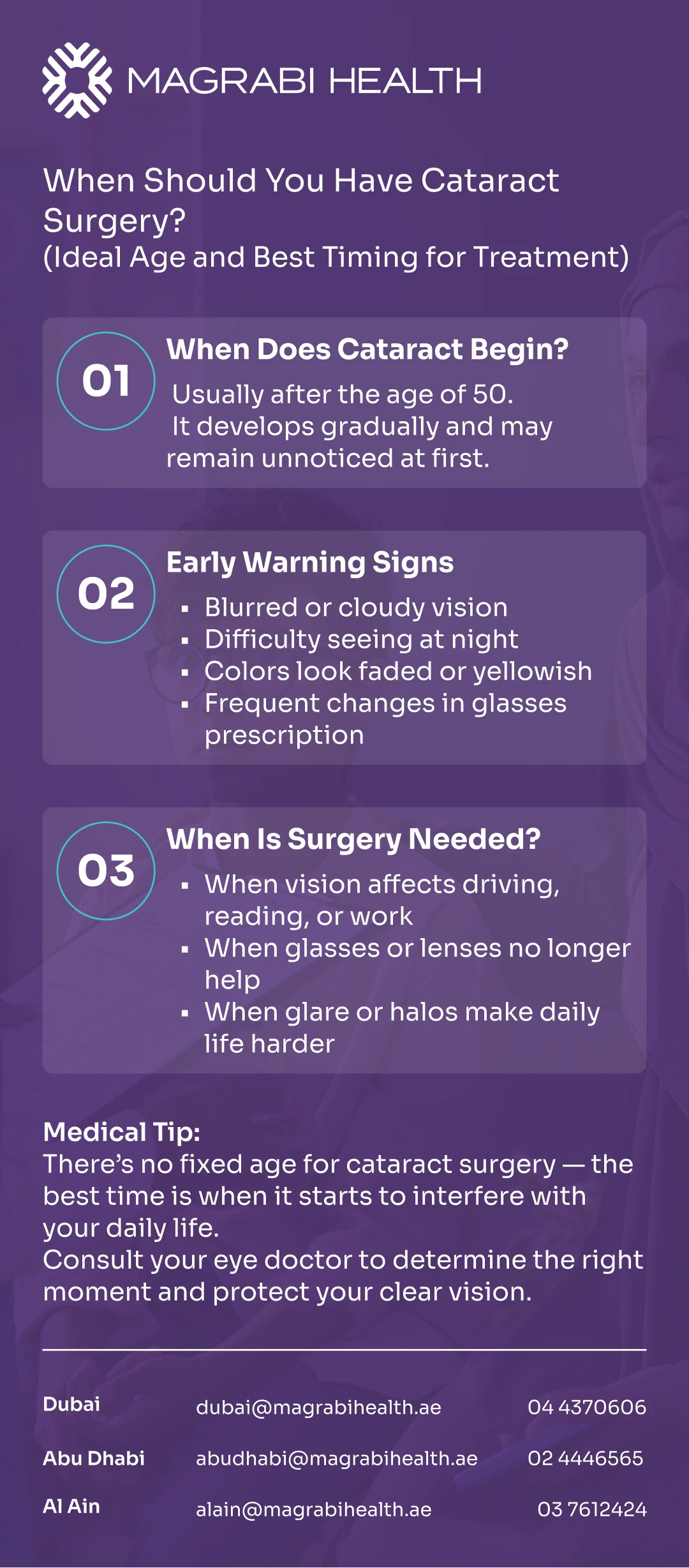Last updated: 11/11/2025
Cataracts are a common age-related eye condition that gradually clouds the lens, causing blurred or faded vision. Most people start noticing changes after age 50 — the typical cataract age.
Understanding how cataract age affects vision and knowing when to have surgery can help preserve long-term eye health. Modern cataract surgery is safe, quick, and highly effective, restoring clear sight and comfort for patients at every cataract age stage.
Explore cataract surgery options, costs, and recovery guidance. Book your cataract consultation now at Magrabi Health.
Cataracts usually begin to appear after the age of 50. The natural lens becomes cloudy over time, causing blurry vision—especially at night or in bright sunlight. They progress slowly, which means many people live with early signs for years before needing surgery. Understanding your cataract age can help you plan regular eye checkups and make informed decisions about treatment.

Even before vision becomes severely cloudy, cataracts often show subtle changes that you can easily miss at first.
Blurred or cloudy vision
Trouble seeing at night or under bright lights
Colors appearing faded or yellowish
Sensitivity to glare
Needing frequent changes in glasses prescription
These are often the beginning stages of cataracts, and your eye doctor can help monitor their progression before surgery becomes necessary.
There’s no single ideal age for cataract surgery. The right time depends on how much cataracts affect your vision and lifestyle.
Before deciding on surgery, doctors usually look for specific signs that cataracts are beginning to interfere with your everyday activities.
You may need cataract surgery if:
Your vision is too blurry for reading, driving, or working.
Glasses no longer improve your sight.
You experience glare or halos around lights.
You have difficulty recognizing faces or details.
In short, it’s not your biological age that determines when to have cataract surgery, but your cataract age — how far the condition has progressed and how much it affects your daily comfort.
If your cataracts are still mild, your doctor may suggest brighter lighting, anti-glare lenses, or stronger prescriptions before recommending surgery.
Technically yes, but most surgeons prefer to perform cataract surgery on one eye at a time. This allows your first eye to heal and your vision to stabilize before treating the second.
Here are the main reasons why cataract surgery is usually done on each eye separately:
To reduce the risk of infection or complications
To ensure the first surgery result is stable before proceeding
To help you adjust better between surgeries
Usually, the second eye is operated on one to two weeks later.
At Magrabi Health Hospitals, our ophthalmology experts guide you through every stage of your cataract journey — from recognizing the right cataract age for surgery to safe recovery and follow-up care. Learn more about personalized, expert-led cataract treatment designed to restore your clear vision on our Cataract Surgery page.
Modern cataract surgery is safe, quick, and highly effective. The procedure takes less than 15 minutes per eye and is done under local anesthesia.
During the recovery phase, most patients notice gradual improvements in vision and comfort within just a few days. Here are the key highlights:
Clearer, brighter vision within days
Colors appear sharper and more vivid
Return to normal activities within a few days
Use of prescribed eye drops to aid healing
Protect your eyes from dust, sunlight, and water during recovery, and always attend follow-up appointments as advised.
For patients at any cataract age, recovery is usually smooth and the improvement in vision is dramatic.
learn more about: life after cataract surgery Precautions, Recovery, and Sunlight Exposure
There’s no fixed best cataract age for surgery — the right time depends on how much cataracts affect your daily life and vision quality. Regular eye exams help detect changes early and plan surgery at the ideal stage for clear, lasting sight. With modern techniques and expert care, cataract surgery offers safe, reliable results that restore confidence and visual comfort at every cataract age.
Wondering about the right time for cataract surgery? Book your consultation at Magrabi Health Hospitals and let our experts guide you to the best timing for clear, lasting vision.
American Academy of Ophthalmology (AAO). Cataract Surgery: What to Expect Before, During, and After.
National Eye Institute (NEI). Facts About Cataract.
Mayo Clinic. Cataract Surgery — Overview and Risks.
U.S. Food and Drug Administration (FDA). Intraocular Lens Implants and Cataract Surgery Safety Information.
Medical Disclaimer:
This article provides general educational information and does not replace professional medical advice.
Consultant Ophthalmologist & Cataract and Glaucoma Specialist
Magrabi Health – Abu Dhabi Branch

Cataract Surgery: Procedure, Benefits, and Recovery Tips

Cataract Causes and Risk Factors Explained by Eye Specialists